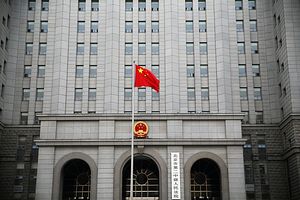Washington — In recent years, using new laws targeting so-called “evil cults,” Chinese President Xi Jinping and his government have arrested, tried, convicted, and imprisoned a wide array of religious leaders viewed as a threat to the one-party system. In a stinging decision that has just been made public, the United Nations Working Group on Arbitrary Detention decided the Chinese government’s detention of one such Buddhist leader Wu Zeheng is arbitrary and in violation of international law, urging his case be resolved. Wu, who had spoken out repeatedly against the Chinese government’s repression of religious practice, received a life sentence for his activities in October 2015.
The Chinese government lives in fear of its population of some 1.4 billion people. With some 150,000 protests annually and annual domestic security expenditures topping $120 billion, the government is struggling to maintain its grip on power. Of special and ongoing focus of the Chinese government is its fear of organized religion.
Officially the Chinese Communist Party is atheist and believes religion will be extinguished when social conditions are improved. China’s Constitution guarantees “freedom of religious belief” and protection of “normal religious activities.” But in practice there is a dramatic gap between these commitments and the harsh reality for religious adherents in China. The Chinese Communist Party exerts extraordinary control over organized religion, out of fear that religious leaders can advance anti-social beliefs and political causes.
The Chinese government is most notorious for its repression of religious minorities, including Tibetan Buddhists, Muslim Uyghurs, Protestants (especially those practicing in underground house churches), Catholics loyal to the Pope, and Falun Gong practitioners. Minority groups do not just face intimidation, harassment, interference with their religious practice, or arbitrary detention by the Chinese government but also crackdown on their places of worship. For example, in the last three years, it is reported that more than 1,700 churches have been demolished or had their crosses torn down. And going back decades more than 6,000 Tibetan Buddhist monasteries and holy places have been destroyed.
A lesser focus of the government’s ire until recently has been on religious leaders and followers of Chinese Buddhism and Taoism, which is integrated with the majority culture of the Han Chinese people, who comprise 90 percent of the country’s population. Despite official government statements these religions exemplify Chinese values, it has dramatically increased its regulation and monitoring of these religious activities, including persecuting troublesome religious leaders under China’s anti-cult laws.
Wu Zeheng’s case exemplifies this practice. China’s relentless persecution of Wu has been criticized by the U.S. Commission on International Religious Freedom, Congressional Executive Commission on China, and Human Rights in China, among many independent organizations examining his case.
Wu first came to the government’s attention after releasing public letters to then Chinese President Jiang Zemin in 1998 and 1999. He submitted a range of suggestions for reforming the one-party system, criticized the government’s policies on controlling religious practice, and warned that unless the government reformed itself, that it would be at risk of collapse. He response to these letters, he was sentenced to and served 11 years in prison on pre-textual charges. In 2014, more than 100 Chinese police staged a raid on Wu Zeheng’s home arresting him and 19 of his students. He was accused of running an illegal religious group that was actually a cult and committing criminal activities that posed a threat to Chinese society. In another closed trial, he was summarily convicted and given a life sentence in prison.
Throughout his time in office, U.S. President Barack Obama downplayed rights abuses in China, preferring to focus on other priorities. This recent decision from the United Nations raises the question as to how President Donald Trump will address these issues. Back in 1990, Trump described how the Chinese government responded to the Tiananmen Square uprising as having shown the world “the power of strength,” but during one of the presidential debates said it was a “horrible thing . . . [that] doesn’t mean at all I was endorsing it.” But on the campaign, he didn’t hold back, excoriating China’s trade policies and threatening to label it a currency manipulator. And he provoked the Chinese government after taking a call from Taiwanese President Tsai Ing-wen, which was the first such discussion between a U.S. and Taiwan president in almost 40 years.
The United States’ commitment to freedom of religion is embedded in the First Amendment to its Constitution. There are hundreds of millions of religious people in China who want nothing more than to be able to worship as they choose. Trump should make clear to the Xi that the U.S. will stand in strong solidarity with those people and the values these religions stand for against the persecution of all people of faith. He should also demand the release of Wu Zeheng.
Jared Genser is an international human rights lawyer and serves as counsel to Wu Zeheng.

































